Catalogue 2025
Atlases
Chemistry
Literacy
CAPE®
Social Sciences Practice
Music English
Revision
Modern
CSEC® Mathematics
Thesauruses Biology
French Science
History
Foreign
Languages
Computing
Sociology
Dictionaries
Spanish
Human and Social Biology
Economics
Physics
Maps
Integrated Science
Geography
Caribbean Schools Catalogue 2025
Welcome to our new Caribbean Schools Catalogue for 2025 which contains a wealth of resources including textbooks, workbooks, revision guides, dictionaries, atlases, readers and digital resources.
At primary, we are delighted to showcase new poetry books in the Collins Big Cat series. These include anthologies, collections and stories in verse from a range of contemporary writers and spoken word performers.
Funny, thought-provoking and beautifully illustrated picture books from Rocket Bird Books will delight and intrigue younger readers, while older readers will find gripping new titles from Barrington Stoke to keep them turning pages.
Our brand-new Primary and Lower Secondary Computing series designed to develop skills in coding and computational thinking, and to show learners how to safely navigate the digital world. Engaging age-appropriate projects support students to put their learning into practice by designing and creating outputs that are meaningful to them.
For CSEC®, we are pleased to announce new publications in science and mathematics. The CSEC® Integrated Science textbook offers authoritative and accessible coverage of the syllabus with recall, application and analysis questions throughout, while the Concise Revision Course for CSEC® Mathematics helps students revise effectively and practise all the question types they will meet in their final exams.
And finally, Shoba Marsha Gayah and Meritta Hyacinth have drawn on their years of classroom expertise to produce a rich and visually engaging CSEC® Social Studies textbook, with a range of targeted tasks and questions on every topic to prepare students for success in their examinations and SBA.

Cathy Martin Collins International Publisher
















Create Your Own…
Author: Becky Goddard-Hill
Provides fun and practical tips to help children build a confident, kind, happy and calm mindset.
• From children’s therapist and award-winning blogger, Becky Goddard-Hill
• Full of simple, practical ideas to help boost confidence
• Fun activities that can be done on their own or with friends and family
• Inspiring stories about acts of kindness
Being You: Poems of Positivity
Author: Daniel Thompson
Powerful poems for positive thinking!

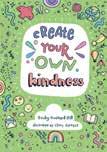

This collection of 50 poems will inspire confidence and courage, help children to overcome worries and spread kindness. With themes of friendship, self-belief, embracing change and celebrating people’s differences.
Outside In: Nature Poems
Author: Daniel Thompson
Inspiring poems to connect with nature.
Spark a love of nature and let the outside in with this collection of 50 poems. With topics on the seasons, sense, wildlife and the joys of the weather.
Graphic Novel Builder
The illustrated guide to making your own comics.
Author: Edward Ross


Covering all the core principles of comics, with a creative cast of characters to show you how, explore the building blocks of the complete creative process and gather all the tools needed to build a graphic novel.

Collins Primary Social Studies for Antigua and Barbuda
Author: Anthea S Thomas
Provide full coverage of the Primary Social Studies syllabus for Antigua and Barbuda.
Collins Antigua Primary Social Studies has been specially developed by an experienced local teacher to meet the needs of schools, teachers and students. It follows a skills-based approach to learning, and is fully set within local and wider Caribbean contexts to allow students a wider knowledge of their own island and the Caribbean.
• Full-colour student’s books for KG to Grade 6 provide bright illustrations and fun activities to interest students
• Skills-based approach, with a wide range of varied activities to promote learning, discussion, critical thinking and crosscurricular learning
• All topics are set within local and wider Caribbean contexts
• Accompanying workbooks provide plenty of activities and puzzles to consolidate learning 20
2 Our cultural heritage
We are learning to:
Earliest inhabitants of Antigua



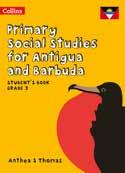


• dene the terms: ‘ancestors’, ‘traditions’, ‘customs’, ‘culture’, ‘family’, ‘ethnic’
• name the earliest inhabitants of Antigua: the Arawaks, the Caribs
• name later settlers who came to Antigua: Europeans, Africans, Indians, Chinese
• know about some different groups and nationalities who settled in Antigua
• describe some local traditions, customs and festivals
• know about the local dialect

• know why it is important to preserve our culture.
What is culture?

When we talk about culture, we are talking about the way we live. Culture is the way of life of a group of people. Our culture includes the way we speak, dance, dress and cook our food, the music we play, the stories we tell and our religion.
The culture we have today was learned from our ancestors who came to live on our island before us. Different groups of people came to settle in Antigua at different times. Each group brought with them their own cultural traditions, which they continued in their new life. For example, our national dish, fungee and pepperpot, was brought to Antigua by the Amerindians. The dialect we speak and our dance came from the Africans, while the language we speak, as well as our major religions, came from the Europeans.
The earliest known people to come and live in Antigua were the Amerindians. They came by canoe from South America looking for food. Areas of Antigua and Barbuda where they settled include:
• Twenty Hill in Parham
• Jolly Beach
• Indian Creek
• Mill Reef
• Mamora Bay
• Green Castle Hill
There were two main groups of Amerindians, the Arawaks and the Caribs.
The Arawaks
The Arawaks, also called Tainos, were gentle and peaceful people who lived in groups of families. They shared their belongings and food with each other.
They built houses made of mud, sticks and grass. The houses were round with thatched roofs.




¡A volar!
Primary Spanish for the Caribbean
This child-centred 5-level course makes learning Spanish fun while meeting the demands of Caribbean teaching and curricula.
• All Pupil Books feature specially commissioned songs and audio for listening and speaking exercises
• Workbooks provide additional material for practice and reinforcement
• Carefully graded exercises allow students to revisit and revise the core vocabulary and language points of each unit


• Teacher’s Guides with step-by-step lesson plans, detailed notes and extension activities to provide teachers the preparation needed for each lesson
• Photocopiable resources for pupils to use in class or at home included in Foundation Level Teacher’s Guide
GUIDES

Level 2 978-0-00-813633-8 £22.00
Level 3 978-0-00-813636-9 £22.00
Level 4 978-0-00-813639-0 £22.00

Escucha y escribe la letra.
Look at how you talk about travel in Spanish. Va en moto He goes by motorbike Ir en carro es aburrido. Going by car is boring. b a c d e
Ejemplo: 1 e
¡Recuerda!
Escucha otra vez y escribe el adjetivo.

5 6 7
Ejemplo: 1 lento

Lee, empareja y completa: ¿rápido o lento?
1 ¡Es verde y !
2 Es grande, anaranjado y
3 ¡Es rojo y súper !
In Spanish, to say ‘Hang on a minute!’, you can use ¡Para el carro! (‘Stop the car!’) a b c d
¡Mira!
4 Es pequeño y
32 treinta y dos
Sample pages from Pupil Book 3

En mi barco, en mi barco Lento… lento… En mi bicicleta,
9 ¿Qué medio de transporte te gusta? Completa las frases.
Si voy de vacaciones, me gusta ir porque Mi medio de transporte favorito es porque No me gusta ir porque
el autobús bus el avión plane el barco boat el camión lorry el carro car el ferry ferry
el helicóptero helicopter el tren train la bicicleta bicycle la moto motorbike lento/a slow rápido/a fast

treinta y tres 33

Fully resourced primary music scheme No music reading required Includes SEND support notes and technology ideas

Authors: Helen MacGregor, Maureen Hanke, Stephen Chadwick, Ian Lawrence, Sue Nicholls and Matthew Holmes
The go-to digital, award-winning, cross-curricular scheme for Primary music.
Music Express provides everything you need to teach a coherently planned Primary music curriculum. It includes fully resourced lessons, planning documents and lots of activities to develop musicianship.
• Diversify music activities to be inclusive of every child’s needs with updated SEND support notes
• Easy-to-use materials to support teachers with little or no musical experience
• A Song Bank with hundreds of songs suitable for all ages and abilities
For more information about Music Express, visit collins.co.uk/musicexpress

Collins Music Early Years Foundation Stage
Authors: Sue Nicholls and Sally Hickman
Ideal for EYFS teachers who aren’t looking for a whole-school music scheme.
• 12 starting points stemming from children’s interests with songs, chants, listening music, images, videos and stories to engage and inspire exploration
• Ideas and activities for Enhancing Continuous Provision, Musical Learning, Home Learning and all Areas of Learning and Development
• Planning and assessment guidance, templates, imagery, vocabulary, background information, notation for music specialists and related reading and songs


Sing! Play! Learn! With Go Kid Music
A contemporary topic-based resource that supports learning across the curriculum.
As well as audio performance and backing tracks, each song comes with an easy-to-follow teaching video with on-screen lyrics and actions. Many songs also feature optional instrumental parts.


Listen and Celebrate
Authors: Nathan Holder, Helen MacGregor, Rachel Shapey
Activities to enrich and diversify music in the classroom.
Introduce Primary and Secondary music learners to a selection of pieces from a range of time periods, countries and styles, celebrating the people who wrote the music and offering an immersive experience through active listening and composing activities.


Inspiring Ideas Series
Handy guides full of practical ideas to support every aspect of music teaching. Whether you’re new to teaching or a seasoned practitioner, this series offers fresh and varied ways to invigorate music lessons.

Primary Music Leader’s Handbook
Author: Dr Elizabeth Stafford
The essential resource for any music subject leader working in a primary setting.
How to Teach
Offers quick and practical ideas, tips, advice and activities to improve specific areas of teaching music.



Magic
Transform your group instrumental lessons.
Recorder Magic
An acclaimed recorder method for beginners at four levels, with fresh new tunes and performance opportunities right from the start. Perfect for specialist and generalist teachers alike.
Ukulele Magic

Everything you and your pupils need to get started on the ukulele – whether solo, with friends or in a whole-class setting. Specially devised for Primary-aged children, this method is available in pupil and teacher editions to suit your needs.
Keyboard Magic
This fun and approachable method introduces the keyboard through enjoyable step-bystep activities and performance pieces. Suitable for group or individual lessons.

Guide beginners with fun exercises, theory and easy songs to play.
Cover the key elements of musical learning with Get Set! Piano books, packed with tunes and ideas to support and inspire young musicians.
Get Set! Piano Christmas Crackers contains over 30 carols for the beginner pianist, featuring a range of techniques and quizzes to support musical development from the very first lessons to Grade 2.
My First Piano introduces young children to the piano through fun activities, rhymes, songs and pieces followed by My First Piano Pieces, Puzzles and Activities


Abracadabra
The trusted instrumental range.
Our established and popular series offers a thorough grounding in basic technique for woodwind, brass, recorder and strings. With carefully graded songs and clear technical guidance, these books are perfect for beginners.










Collins Mental Maths
Support the development of key mathematical skills with six one-a- week mental maths test books.
• Activity books that provide a fun way to test mathematical understanding and improve various maths skills

• How well did I do? charts help children track their progress
• Parental notes to support learning at home
• Weekly tests to improve understanding and retention
• Essential practice for mental maths skills to help support the development of skills for the SEA, 11+ and the PEP
Mental Maths Ages 5-6
Mental Maths Ages 6-7
Mental Maths Ages 7-8
Mental Maths Ages 8-9
Mental Maths Ages 9-10
Mental Maths Ages 10-11
978-0-00-745789-2 £3.99
978-0-00-745790-8 £3.99
978-0-00-745791-5 £3.99
978-0-00-745792-2 £3.99
978-0-00-745793-9 £3.99
978-0-00-745794-6 £3.99
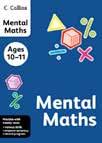




Collins Mental Maths: Targeted Practice Workbooks
Ideal for improving confidence in mental maths skills for assessment.
Using a repeated practice method that is proven to work, these books help to improve fluency in maths skills and performance in tests and assessments.
• Fun and varied activities to develop mental maths strategies
• 8 listening tests per book are accessible via QR codes
• Progress tests throughout the book for ongoing assessment and for SATs
• Pull-out answer section included
Year 1 Mental Maths Targeted Workbook
Year 2 Mental Maths Targeted Workbook
Year 3 Mental Maths Targeted Workbook
Year 4 Mental Maths Targeted Workbook
Year 5 Mental Maths Targeted Workbook
Year 6 Mental Maths SATS Targeted Practice Workbook

978-0-00-867024-5 £4.99
978-0-00-867025-2 £4.99
978-0-00-867026-9 £4.99
978-0-00-867027-6 £4.99
978-0-00-867028-3 £4.99
978-0-00-867029-0 £4.99





Collins Easy Learning
Provide parents with reassurance while supporting their child’s learning at home.
• Give 3–11-year-olds a head start with practice skills books that help develop key literacy and number skills through lots of fun activities
• Boost children’s confidence and enjoyment with games, clear explanations and tips, as well as answers to check understanding
• Build good learning habits with advice on how to support learning for parents, including What you need to know and Taking it further notes












Complete support for Primary reading
Foster a lifelong love of reading with over 1,000 book-banded readers featuring beautiful illustrations for every step of a child’s reading journey.
• Develop key reading skills including inference and deduction through comprehensive teaching and assessment support
• High-quality fiction and non-fiction include a variety of genres to support teaching across the curriculum
• The wide range of Big Cat readers ensures learners of all needs and abilities are supported
• Digital resources offer an enhanced reading experience
• Support teaching and assessment with lesson plans and worksheets







• Supports front-of-class teacher modelling and shared reading when used on interactive whiteboards
• Provides a seamless transition between school and home
• Videos that model how to say phonemes correctly, hints and tips for supporting children with their reading
• Worksheets, guided reading notes and comprehension activities are also included





for the Caribbean
Travel across the islands with the Caribbean-specific range of Collins Big Cat!
Inspiring stories by expert local authors and brilliant illustrators with a unique understanding of the region.
• Suitable for a wide range of readership in the Caribbean and beyond
• Mapped to the Big Cat reading scheme to help build fluency in primary reading
• Complete with reading notes, comprehensive teaching support and available as eBooks
















Poetry that challenges traditional conventions with more diverse views and a contemporary feel
Instil a love of poetry and reading for pleasure with 12 captivating poetry books with a mix of anthologies, collections and stories in verse.
• Poetry that challenges traditional conventions with more diverse views and a contemporary feel
• After-reading activities and lesson plans support comprehension of the text and provide further learning opportunities
• Provide inspiration for writing activities, a wealth of spoken language opportunities, and raise confidence in prosody and fluency


Shhhh! Can you keep a secret?
This is Audrey Fry.
No, that’s not the secret.
This is Audrey’s room.
(That’s not the secret either.)
Here are Audrey’s wigs!
They are part of the secret. Audrey has alopecia universalis.
That means she has no hair.
This isn’t a secret.
Her friends and family know.







Big Cat aims to give visibility and representation to all by featuring a range of different lived experiences. Discover characters from different ethnic and social backgrounds, books that are physically inclusive and neurodiverse that allow readers to feel accepted and see themselves in books.





Books that Support Wellbeing
Support learners' health and wellbeing while they learn to love reading. Books that cover topics such as healthy eating, meditation, and screentime, as well as tackling topics that affect children’s mental health such as friendships, family relationships, self-esteem, feelings and emotions.







Contemporary Fairy Tales with a Twist
Explore modern fairy tales that challenge traditional conventions. Traditional tales with a modern twist, which deliberately challenge the traditional fairy tale world conventions of gender, ethnicity and agency. Leading children’s authors have brought familiar tales up-to-date, reimagining characters, plot lines and settings.

Gripping Graphic Novels
Comic book style narratives to hook even the most reluctant readers.
Immersive worlds and incredible illustrations jump straight off the page in this series of graphic novels.
For full list of titles, visit collins.co.uk/bigcat








Explore STEM careers with Tara and Dani Binns!
• Filled with fast-paced adventures, exploring a different STEM career through the eyes of Tara and her sister, Dani
• Present a positive female role model to broaden horizons and promote a view of gender parity in the working world





Get reluctant readers hooked on books!
• The world of Shinoy and the Chaos Crew reflects comics, gaming and fantasy
• This action-packed series offers dynamic illustrations, thrilling adventures and great storytelling
• Different book types encourage reading for pleasure with humorous fiction, non-fiction and graphic novels








Graphic novels





Support every reader of every ability

Develop fluency and comprehension whilst building confidence. These dual-banded books offer Lower Primary reading levels with themes and illustrations at Upper Primary interest levels, to bring every struggling reader up to speed with systematic progression. For




Ease the transition from learning phonics to becoming independent readers
Develop reading confidence, stamina and speed with Big Cat for Little Wandle Fluency!
With a carefully designed progression and increasing word counts across 10 fluency levels, 60 exciting chapter books help children to complete the code, extend vocabulary and gain confidence – easing the transition from learning phonics to becoming independent readers.
How does it work?
• Determine which books children will be taught with a simple one-minute fluency assessment, which gives you a reading rate and accuracy percentage for each pupil
• Each book has six chapters that can be taught in half-hour lessons over two to three weeks and includes downloadable lesson plans and word sheets to support your teaching
• The perfect follow-on to teaching phonics with Little Wandle Letters and Sounds Revised SSP








Picture books so good, they turn children into booklovers
New Titles Age 2+
Take a look at the newest additions to Rocket Bird Books, beautifully curated, content-rich picture books that will be read again and again.



Ant Life
Worker-ant Amy takes her indecisive sister, Anita, to the colony careers day to find her perfect job. This misunderstood species may be tiny, but Anita discovers ants are aweinspiring!
Ant Life (HB) 9781915395207 • £12.99
Brenda’s Revenge
Brenda is just a cat, so her loving owner helps her style her hair, get dressed, learn manners and practise writing! Will Brenda’s owner ever learn it isn’t nice to force someone to do things?
Brenda’s Revenge (PB) 9781915395191 • £7.99
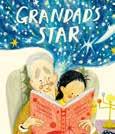

Grandad’s Star
A little girl, guided by her famous astronomer Grandad, learns about the stars. One day, he begins to forget his star stories and eventually her name. A story that proves the love we share can transcend galaxies and generations.
Grandad’s Star (HB) 9781915395108 • £12.99


Slug Life
Meet Stevie, the world’s grumpiest slug, and find out why. Sent by his mum to slug self-esteem class, Stevie’s about to discover why he and his slimy kin are awesome.
Slug Life (HB) 9781915395092 • £12.99 (PB) 9781915395283 • £7.99

Invisible Dogs
At her new school, Ida feels like the odd one out. Her Grandpa knows a game to cheer her up… invisible shops! But her invisible dogs cause canine chaos! By sharing her imaginative inner life, Ida makes new friends.
Invisible Dogs (HB) 9781915395061 • £12.99



Pandora and the Story Forge
Pandora is an explorer, a collector of words, a forger of stories and weaver of tales. Enter her world of words and you’ll never see stories in quite the same way.
Pandora and the Story Forge (HB) 9781915395177 • £12.99
Lionel
Lionel loves joining in with what his friends are doing, but he’s so huge his enthusiasm often leads to disaster. Only when Lionel finds a quiet space can he discover his own game and invite his friends to play.
Lionel (HB) 9781915395214 • £12.99


Every child can be a reader with Barrington Stoke
For over 25 years we’ve been pioneering super-readable, dyslexia-friendly fiction to help every child become a reader. Our shorter novels promote reading for pleasure, ideal for:
• struggling readers
• reluctant readers
• confident readers looking for a quality short read Short novels for building confidence
New Titles Age 5+
Available as eBooks
Key features


• Off-white/cream heavier paper
• Well-spaced and appealing layouts
• Easy-read font to help reading flow
• Short chapters with plenty of rest breaks
• Filled with engaging illustrations




Reading Ages 6, 7 and 8 Quality first chapter books, perfect for emerging readers








Short novels for building confidence
Reading Ages 6, 6.5, 7, 8 and 9





Content aimed at younger teens
Reading Ages 6, 6.5, 7, 8, 9 and 11








Age-appropriate content
Reading Ages 7, 8 and 9
InterestAge






Timeless classics retold by award-winning authors
Key scenes accentuated but in a more concise format






Complete and unabridged editions of classic set texts
Beautifully packaged with an easy-read design, suitable for all readers







New Collins International Primary and Lower Secondary Computing
Authors: Rebecca Franks, Dr Tracy Gardner, Laura Sach and Liz Smart
Offer a robust, computing-specific pedagogical approach enhanced by real-world applications, with a key focus on unplugged learning, culturally responsive teaching and project-based activities.
Organised around six themes relating to computing and digital literacy – Our digital world; Content creation; Create with code; How computers work; Connect the world; The power of data.
Student’s Books
• Develop students’ computing and digital literacy skills through fun, practical and relatable projects, using a rich variety of sources with an international focus
• Includes the latest hardware and software information, additionally exploring Artificial Intelligence, and empowers students to navigate the online world safely by equipping them with crucial digital safety skills
• Regular opportunities for discussion, group work, investigation and design encourage active learning throughout, including unplugged learning to explore concepts and foster computational thinking skills
Workbooks
• Designed to be used alongside the Student’s Book following the same topics and unit structure, clearly signalled activities provide further practice and extension material
• Fun and varied exercises develop and reinforce key computing skills, computational thinking principles like abstraction and decomposition skills, as well as programming and data literacy
• Ample opportunities for students to self-evaluate and reflect on progress, supporting their own metacognition and providing evidence for teacher assessment
Teacher’s Guides
• Built around an internationally sound pedagogy, this teaching framework uses a project-based approach with real-life contexts and culturally responsive examples
• Detailed lesson plans, key computing pedagogies summaries and references to further reading provide valuable support for non-specialists and develop teachers’ own practice
About the Authors
Written by an all-female team of experts with a breadth of computing experience across industry, education and research. Their culturally responsive approach provides teachers with an accessible and inclusive learning experience for all ages and inspires greater participation and tech career pathways for all.





Interview a guest Chapter 1.3
What do you already know?
• A robot is a digital device that performs a useful task on its own.
• A robot may be able to move or talk.
• Robots can help humans with tasks.
Designing a robot
End of chapter project:
Design
Here is an example of an interview.

6
Sample pages from Student’s Book 1




Collins International Computing series provides in-depth coverage of the Cambridge curriculum frameworks for Primary and Lower Secondary Computing (0059/0860) and Primary and Lower Secondary Digital Literacy (0072/0082), as well as the UK national curriculum for Computing at Primary and Secondary level.

Collins Classroom Classics
Timeless editions accompanied by supportive introductions and glossaries.
• Introductions situate the novel in its period in time, providing useful information on themes, structure and literary techniques
• Glossaries familiarise students with terms and references to get the most out of the text
• Stylistic features help get students thinking about different ways of interpreting the text
• Further reading lists included, with key articles and theoretical texts
• The Shakespeare editions offer text notes side-by-side to the main text as well as a theme and character index






























Collins Twelfth Night and The Tempest CSEC® Edition
Ideal for students preparing for the CSEC® English B examinations.
These editions contain the full texts of The Tempest and Twelfth Night, with clear and supportive notes. A detailed introduction and a guide to each act and scene give students everything they need to study the plays for CSEC® English B.
• Help your students understand the language of the play with clear notes on each page
• Encourage learning about Shakespeare's world and the context with lively introductions
• Understand characters, themes and dramatic techniques with a detailed guide to each scene
• Trace the development of themes across the play with succinct summaries and links to the key scene
• Prepare for final examinations with practice exam questions and annotated sample responses to show students how to improve their work


Collins Starting Shakespeare
A bestselling introduction to Shakespeare, his world and his plays.
• Provides stimulating ideas and resources to enable students to get to grips with the plays in an enjoyable way
• A range of activities, covering Key Assessment Objectives, including the study of historical context, plot, genre, character, language and staging
• Includes advice on how to prepare for and approach the exam
• Gives students opportunity to practise exam-style questions

Collins Readers: The Lion, the Witch and the
This timeless novel provides many wonderful passages for the study of narrative, as well as complex characters and motivations ideal for class discussion.

Collins CSEC® Concise English A
Provide full coverage of the syllabus in an accessible format. It adopts a practical and supportive approach and gives comprehensive guidance on the School Based Assessment.
• Organised by question paper to help students build the skills needed effectively, moving from skills-building activities to examination-style tasks
• Includes guidance on where students might go wrong when answering multiple choice questions
• Practice questions and annotated sample responses help students understand how to achieve higher marks
• Exam practice sections included for Paper 1 and Paper 2
• Dedicated chapter on the School Based Assessment, including how to choose a suitable topic, how to carry out the work required and how to write up the report
• Annotated sample responses to show students how to improve their work
1.6 Identifying antonyms
•
Learn
Why
You
When you have worked out the literal meaning of the word, add an extra step and find a word that means
The weather is milder today even though a storm is supposed to be passing by sometime soon. The sun isn’t quite as harsh and the winds are hardly moving the palm fronds as I look out of my window past the shutters and down to the still sea. With any luck I’ll be able to get out and fish for a while before any trouble begins.

Find an antonym of the word ‘milder’ in the extract above. Choose from:
(a) harsher
(b) hotter
(c) wilder
(d) more severe
Here is an example of how you might jot down down your thoughts around the text as you work through the steps to find an antonym for ‘milder’.
Step 1: If I obscure this word then I think a word to describe the quality of the weather is needed. Could it be hot or cool?
Step 2: Read around the gap: In the sentences that follow it mentions the weather having changed, which makes me think that the word describes a change of some kind.
are the
The weather is milder today even though a storm is supposed to be passing by sometime soon. The sun isn’t quite as harsh and the winds are hardly moving the palm fronds as I look out of my window past the shutters and down to the still sea. With any luck I’ll be able to get out and fish for a while before any trouble begins.
16 1.6 Identifying antonyms
Step 3: Consider the sentence structure: ‘Milder’ may mean the weather after a storm, which is usually calm.

Step 4: Think of similar words. I have heard the word ‘mild’ used to describe tastes that are not too strong or spicy.
Step 5: I think that ‘milder’ describes calmer weather after the storm. I am now thinking that either option (a) or (c) would be an antonym for it. (b) is too specific about temperature.
Practice task
1 What is an antonym for ‘still’ as used in the extract above? Choose from the following: (A) moving (B) undulating (C) travelling (D) fidgety
Write down your thoughts, as you follow the five steps.
Remember You may also need to match the register of the rest of the sentence.
Revision tip Pick ten words at random every day and work out their antonyms.
Apply the skills
Practice task
2 Find four antonyms for the underlined word in this sentence. Then show how you would decide which one is most appropriate.
Aruba’s weather stays moderate, however, due to a constant ocean breeze.
3 Find four antonyms for the underlined word in this sentence. Then show how you would decide which one is most appropriate.
In contrast, Dominica has a lush, tropical, heavily precipitated forest; average rainfall in the interior can be over 300 inches per year.
elements of a good
A short story should have a single, clear storyline. It should also end in a way that is satisfying, if not always happy or straightforward. Most stories depend on the main character facing a problem or challenge. This problem often brings the character into conflict with someone or something. As the story develops, the main
16 12/12/16 8:53 pm

4 Find four antonyms for the underlined word in this sentence. Then show how you would decide which one is most appropriate. While weather patterns vary from island to island in the Caribbean, the one thing that is consistent about Caribbean weather is its year-round beauty. 17 Paper 1 08134_CSEC_English_Paper1_Ch01.indd


Collins Junior History of Grenada
Author: Dr Nicole Phillip Dowe
Help students gain a solid understanding of Grenadian history with Collins Junior History of Grenada.
Taking students through a wide range of topics including Identity, Slavery and Resistance, Emancipation, the Socialist Revolution, and modernday Grenadian art, literature and sport, the course will provide the key analytical skills needed to succeed in assessments and think critically about Grenadian history.
• Developed and written specifically for Grenada by the Head of the University of the West Indies
• Tailored to students at Upper Primary and Lower Secondary level
• Full coverage of the Grenada syllabus
• Practical activities including research tasks, projects and discussions, to engage students and bring units to life
• End-of-unit questions and Did you know…? boxes consolidate and strengthen students’ understanding


Collins History for Trinidad and Tobago
Developed and written specially for Trinidad and Tobago with local teachers.
Collins History for Trinidad and Tobago Forms 1, 2 and 3 is suitable for all students studying history at Lower Secondary. With full coverage of the syllabus, this skills-based course helps students develop the analytical and problem-solving skills needed for success.
• Full coverage of the Trinidad and Tobago History syllabus
• Wide range of practice activities and case studies help students develop analytical and problem-solving skills
• Helps students gain a strong foundation to prepare them to study history at CSEC® level
• Projects and discussion points help students start to develop skills for the School Based Assessment
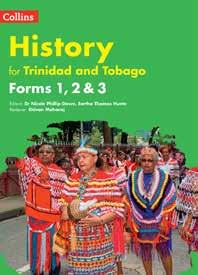
Collins Geography for the Caribbean
Help students develop the essential analytical and problem-solving skills needed to prepare for the study of geography at CSEC®.
Collins Geography for the Caribbean is suitable for all students in the Caribbean who are studying geography at Lower Secondary level, with topics for Forms 1 to 3, Grades 7 to 9. The wide range of activities includes ideas for projects and discussion points to help develop the skills needed for the SBA, as well as field and map-work skills.
• Developed and written specially for the Caribbean, with Caribbean teachers
• Covers topics from human geography and physical geography relevant to and all fully contextualised for the Caribbean
• Wide range of practice activities and case studies help students develop the analytical and problem-solving skills that are essential for CSEC®
• Includes fieldwork and map-work skills
• Projects and discussion points provided to help students develop skills for the School Based Assessment
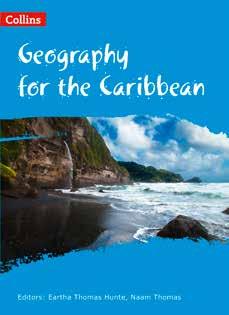
TerritoryArea (km2)Population size
Antigua and Barbuda 440 91,295
The Bahamas 13,878 321,834
Barbados 431 289,680
Belize 22,966 340,844
Dominica 754 73,449
Grenada 344 110,152
Guyana 214,970 735,554
Haiti 27,7509,996,731
Jamaica 10,9912,930,050
St Kitts and Nevis 261 51,538
St Lucia 616 163,362
at reasons that we group the territories together as a region. The countries of the Caribbean Community are not the only countries of the Caribbean region. Geographers divide the islands of the Caribbean Sea into two clusters: the Greater and Lesser Antilles.

St Vincent and the Grenadines 389 102,918
Suriname 163,821 573,311
Trinidad and Tobago 5,1311,223,916
The Antilles s
The Greater Antilles is made up of five islands – Cuba, the Cayman Islands, Hispaniola (Dominican Republic and Haiti), Puerto Rico and Jamaica. The Greater Antilles makes up more than 90% of the land area of the West Indies. These islands are also home to more than 90% of the population of the West Indies.
The Lesser Antilles is made up of eight independent countries – Antigua and Barbuda; Barbados; Dominica; Grenada; Saint Kitts and Nevis; Saint Lucia; Saint Vincent and the Grenadines; Trinidad and Tobago – as well as 16 other non-sovereign states and territories. The islands of the Lesser Antilles are divided into:
• Windward Islands in the south
• Leeward Islands in the north
• Leeward Antilles in the west.
3. Identify five countries in the Lesser Antilles and name their capital cities.
4. Which cluster of islands has the greater number of small islands – the Greater or Lesser Antilles? 5. Name three of the Leeward Islands and three of the Windward Islands.
Did you know...?
The Puerto Rico Trench to the north of Puerto Rico is the deepest point in the Atlantic Ocean.
Collins Secondary Geography
1, 2 & 3 for Trinidad and Tobago
Provide full coverage of the Trinidad and Tobago syllabus for Lower Secondary Geography for forms 1, 2 & 3.
This skills-based and activity-led course helps students to develop the analytical and problem-solving skills they need to gain a strong foundation in geography to prepare them for CSEC®. Included are a wide range of activities, such as project ideas and discussion points to help develop the skills needed for the SBA, as well as field and map-work skills, with additional activities given in the accompanying Workbook.
• Covers topics from human geography and physical geography relevant to Trinidad and Tobago and the wider Caribbean, and all fully contextualised for students in Trinidad and Tobago
• Wide range of practice activities and case studies help students develop their analytical and problem-solving skills
• Includes fieldwork and map-work skills
• Accompanying Workbook provides additional opportunities for written activities to help students consolidate learning

natural feature such as a coastline or river suggests where a boundary lies. However, there are many other reasons boundaries may lie in a particular place. You will look at some of these reasons on this page.
Treaties
A treaty is an agreement between two or more regions or countries. There can be treaties which agree land borders or maritime agreements, which establish a specific ocean or sea boundary between two countries (see 9.7).
Demarcating boundaries
Sometimes a government will demarcate a particular boundary. Part of demarcating a boundary is signage, which shows where a boundary begins. This may be changed if the government changes. For example, when the British took over rule of Trinidad in 1797, they tried to change the structure of the Spanish Cabildo to reflect the British style of local government by setting up a town council. Eventually, by 1927, the Division of Trinidad Act divided the island into eight counties. Each county was sub-divided into wards for election purposes.

Discussion
Examine the county and regional corporation lines on the maps. Compare these to a physical map of Trinidad and Tobago. Talk about the reasons for these boundaries.

Collins CSEC® Geography Atlas
Skills Workbook
Provide skills practice for the CSEC® Geography exam and SBA.
This workbook focuses on map-work skills, field studies skills and the interpretation of geographical data, and will help students develop the problem-solving and analytical skills they need for exam success.
• Practical workbook that can be used to supplement any CSEC® Geography textbook
• All activities based on the CSEC® Geography syllabus and fully contextualised for the Caribbean
• Covers map-work skills including the use and interpretation of largescale maps
• Includes activities and practice questions that help students develop the problem-solving and analytical skills needed for CSEC®
• Encourages practice of skills needed for field studies and the School Based Assessment



Collins Caribbean Social Studies
A content and activity-led course set in contexts relevant to the Caribbean.
Suitable for Lower Secondary students in all parts of the Caribbean, this course has been specially written to help students develop the skills they need for success in Social Studies.
• Developed and written specifically for the Caribbean
• Helps students gain a strong foundation in social studies to prepare to study the individual subjects at CSEC® level
• Student’s books for each form (Form 1, Form 2 and Form 3)

• Accompanying workbooks for each level provide opportunities for written activities and help students consolidate learning


Reasons for Caribbean integration
Reasons for Caribbean integration
We are learning to:
• examine reasons for the existence of the Caribbean as a region
• suggest ways of strengthening Caribbean integration.
Sometimes countries from an area join together to cooperate as a group. This is known as regional integration
Each territory in the Caribbean is very small, with limited resources and a tiny population in comparison to its more powerful neighbours in North and South America. There are several reasons that the territories of this region have agreed to cooperate as a unified region:
• geography of the region
• common history
• integration movements including sporting and economic agreements.
Geography of the region
Compared with their larger neighbours, the territories of the Caribbean need to join together in order to represent a larger collection of people. They share the same geographic location and many of the same geographical features:
• island geography – large areas of coastline as a result of being surrounded on all sides by the sea
• tropical rainforests – most of the territories have tropical climates with tropical rainforest vegetation and diverse species of plants and animals
• hazards such as storms, hurricanes and earthquakes.
The many small islands each face the challenge of limited resources, as well as vulnerability to natural disasters. By working together as a region, the territories of the Caribbean are better able to manage the challenges of their geographical resources.

Common history and culture
The countries of the Caribbean share many similarities such as history, language and culture. The effects of globalisation have affected the islands of the Caribbean in similar ways, and many of the islands share similar social problems.
Because of these similarities, the countries of the Caribbean benefit from joining together as a single region.
For example, the most popular sport in the West Indies is cricket. The British originally brought the game to the West Indies under colonial rule. The earliest cricket matches took place in the early 1800s, among officers of the British military Cricket became a symbol of the Caribbean people’s struggle to be free of colonisation. In the early days cricket clubs were white-only, and slaves were not allowed to take part. Black players were forced to found their own clubs. This changed as inter-island competitions became more frequently organised. The competitions brought together people of all backgrounds from each island as they shared the desire to see their home island win.

The West Indies cricket

Discussion
Activity
1. Which of the following types of habitat are most commonly found in the Caribbean region?
a) desert b) mountains c) beach
2. In your own words define ‘regional integration’ and explain how it works in the Caribbean. Exercise
Write a reflective journal entry titled ‘I love living in the Caribbean’. Highlight at least three aspects of the Caribbean region that you love.
272 Lower Secondary Social Studies: Reasons for Caribbean integration
3. The Caribbean region is situated near the Tropic of Cancer. Suggest four ways that this affects the geography of the region.
4. Why do you think cricket is so popular in the Caribbean?
5. At first, cricket was a game for the colonial ‘masters’ and the slaves were not allowed to play. What changed this?
6. Explain what you understand by regional integration in sport. Exercise
Discuss why the sizes of the Caribbean territories make it important for them to cooperate as a single region.
Collins Social Studies for Jamaica
Developed and written specifically for Jamaica and fully covers the requirements of the National Standard Curriculum for Grades 7 to 9 in Social Studies.
• Social Studies topics are brought to life with real-life case studies, activities and discussion points all specially developed for Jamaican contexts
• Activities and discussion points encourage students to develop criticalthinking skills and to apply what they have learned
• Wide range of content – including real-life photographs, charts, diagrams and case studies – and exceptionally clear layouts help make the subject engaging for all students
• Student’s Books include exercises and activities suitable for all students, to support or challenge students as needed
• Accompanying Workbooks for each level provide opportunities for extra written activities and help students consolidate learning
Student’s Book 7 978-0-00-841396-5 £16.50
Student’s Book 8 978-0-00-841397-2 £16.50
Student’s Book 9 978-0-00-841398-9 £16.50 WORKBOOKS
Collins Secondary Social Sciences for Trinidad and Tobago
A content and activity-led course set in contexts relevant to Trinidad and Tobago.
This course has been developed to help lower secondary students acquire the skills they need to succeed in Social Sciences in Trinidad and Tobago.
• Provides full coverage of the Trinidad and Tobago syllabus
• Brings Social Science topics to life with photographs and case studies featuring local and global contexts
• Student books available for each form (Form 1, Form 2 and Form 3)
• Accompanying workbooks for each level provide opportunities for written activities and help students consolidate learning
STUDENT’S BOOKS
Student’s Book 1 978-0-00-811588-3 £16.50
Student’s Book 2 978-0-00-811590-6 £16.50
Student’s Book 3 978-0-00-811591-3 £16.50
WORKBOOKS
Workbook 1 978-0-00-811592-0
Workbook 3 978-0-00-811594-4

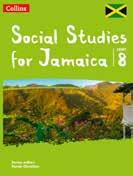




Collins CSEC® Social Studies
Authors: Shoba Marsha Gayah and Meritta Hyacinth
Provide a comprehensive and engaging approach to the latest CSEC® Social Studies syllabus.
Collins CSEC® Social Studies equips students with all the tools they need to succeed. It provides full coverage of the CXC® syllabus, ensuring students are fully prepared for their examination and the SBA.
• Written in clear, accessible language, the textbook includes questions and activities on all aspects of the Social Studies syllabus
• Case studies, clear definitions of key terms, infographics, diagrams, charts, photographs and illustrations help explain core concepts
• Knowledge and comprehension questions and End of chapter summaries consolidate learning and reinforce understanding
• End of chapter questions help students to practise the different question types they will expect to see in their exams

• Use of knowledge questions enable students to apply their learning to real-life contexts
• SBA skills practice tasks develop students' analysis and critical thinking skills and the ability to draw logical conclusions from information
• Written and reviewed by an experienced team of Caribbean teachers and examiners
Belize,

to include hydroponic and aquaponic systems to grow plants in water without the use of soil. As innovative methods of planting, growing and harvesting crops become available, training needs to be offered to ensure the workforce has the right skills.
The agricultural sector in the Caribbean faces a number of challenges:
impact of climate change
frequency of natural disasters
pests and diseases on the farms
competition for arable land from other uses such as housing.
Agriculture is sometimes stigmatized in the region as an industry for less-educated, poorer individuals. Regional governments and the private sector should work to alter the negative impression of agriculture to attract younger workers into the sector.
Fishing
The fishing industry is very important to the Caribbean region. In Belize, fishing is done both for subsistence (for use by the fisherman and his family) and for export which supports the economy. Fish is a main source of protein and the sector needs to be protected from overfishing and illegal fishing.

Mining Mining


Secondary Modern Foreign Languages
Mission: français
A fresh approach to teaching French.
Mission: français delivers engaging course content via Pupil Books, Teacher Guides and Grammar Workbooks.
Pupil Books – have support material embedded throughout and motivate students with an engaging comic book story that runs throughout the course.
Workbooks – encourage students to develop their grammar skills with attractive full-colour workbooks with full explanation of all grammar points covered and plenty of practice questions.
Teacher Packs – comprehensive support for teachers with readyto-use lesson plans.




Ça va très mal aujourd’hui.

Collins CSEC® French
Secondary French for the Caribbean.
Collins CSEC® French provides comprehensive coverage of the CSEC® French syllabus. With a clear structure and engaging content, the course has been carefully planned around topic-based units so that language and skills are taught in context.
• Full syllabus coverage with clear learning objectives
• Skills-based communicative approach with equal coverage given to all four skills: reading, writing, listening and speaking
• Clear, colourful layout with consistent structure
• Carefully graded exercises ensure progression and reinforcement throughout the course
• Plenty of opportunities for recap and revision
• Accompanying workbook provides extra activities for language development skills to reinforce knowledge








pays,
Touba est
par les Sénégalais, à leur réveil, durant la journée et en rentrant au foyer après de longues heures de travail.
J’en prends au moins quatre dans la journée », confesse un vendeur de tissus au marché GrandYoff (quartier de Dakar), en montrant une tasse à café jetable vide qu’il s’apprête à lancer dans une poubelle. « Je ne connais rien de plus énergisant que le café Touba. » Au début du dix-neuvième siècle on remarquait qu’en buvant du café local on pouvait rester éveillé afin de beaucoup travailler. De nos jours, le café Touba continue d’occuper une place de choix dans l’alimentation des Sénégalais. Le café Touba est une boisson préparée à base du café arabica local aromatisé. On y ajoute une espèce de poivre (‘’djar’’ en wolof) et, parfois des clous de girofle, ce qui lui donne son «


au moins cinq tasses par jour. Mais on ne voit pas souvent les chaînes américaines comme Starbucks en France. Pourquoi ? C’est parce que dans leur majorité, les Français apprécient le café noir, fort et nature. Un peu de lait ou du sucre peutêtre, mais autrement ils n’ajoutent rien. Les Français sont des consommateurs « sociaux » de café. « Un café à emporter, s’il vous plaît !» n’est pas français ! 98 pour cent des buveurs réguliers de café français le consomment sur place, soit pour prendre une pause détente, soit pour un moment agréable de convivialité entre amis. En France, les bistrots de quartier et les petits cafés en centre-ville font partie de la culture. Dans les pays anglo-saxons, comme aux États-Unis ou au Royaume-Uni par exemple, les gens aiment grignoter toutes les deux heures. Les Français, pourtant, préfèrent des repas plus copieux que les établissements comme Starbucks ne proposent pas. De plus, les serveurs typiquement français parlent avec leurs clients, ce que les baristas de Starbucks – entreprise bien connue pour son chiffre d'affaires élevé – ne font pas. Trouvés surtout dans les grandes villes, comme Paris ou Lyon et dans les aéroports, Starbucks a ses clients fidèles. Mais pour les Français, pour qui le café symbolise un moment agréable et joyeux
1
1
2




Secondary Modern Foreign Languages
¡A explorar!
Secondary Spanish for the Caribbean.
Designed to meet the requirements of Secondary school curricula throughout the Caribbean, ¡A explorar! is a carefully structured three-level course with clear progression and comprehensive coverage of key vocabulary, grammar and functional language. The course is planned around topic-based units so that language learning and skills development can be taught in real-world contexts.
• A highly illustrated lively design, clear layout and accessible features
• Written and developed in association with teachers and consultants in the Caribbean
• Continuous reinforcement of language learned throughout the course, with revision sections at regular intervals
• Latin American Spanish vocabulary used throughout, with informative notes in the Teacher’s Guide about variants found within Latin America and the Caribbean
• A strong cultural focus, offering stimulating and thought-provoking insights into Hispanic societies, with Español en acción spreads included in every unit
• Audio files to support listening activities are available online through the Collins website




Collins CSEC® Spanish
Secondary Spanish for the Caribbean.
Collins CSEC® Spanish provides comprehensive coverage of the CSEC® Spanish syllabus. With a clear structure and engaging content, the course has been carefully planned around topic-based units so that language and skills are taught in context.
• Full syllabus coverage with clear learning objectives
• Skills-based communicative approach with equal coverage given to all four skills: reading, writing, listening and speaking
• Clear, colourful layout
• Carefully graded exercises that ensure progression throughout the course
• Grammar and vocabulary boxes to enable quick reference
• Plenty of opportunities for recap and revision
• Accompanying workbook provides extra activities to encourage skills development and language practice
• The perfect follow-on from the Collins ¡A explorar! series
4.1 ¿Quieres ir al cine?
¿Por qué es importante tener tiempo libre?
1 ¿Adónde van? Empareja los mensajes con las fotos. Arrange to go out with friends
3 Escribe la forma correcta de los verbos.
1 Hola, Lara. ¿(Querer) ir a la playa conmigo el domingo por la mañana?
2 Quiero ir al concierto pero no (poder) porque no hay entradas.
3 Mía y Julián (querer) venir a la fiesta con nosotros.

1 2 3 16:57 Hola, Sergio. ¿Quieres ir al polideportivo esta tarde sobre las siete? Me gustaría jugar al tenis o al básquetbol. ¿Qué te parece?
4 Hola, Gabriela. ¿Quieres salir el viernes por la noche para celebrar mi cumpleaños? Voy al restaurante italiano con mis compañeros de clase. ¿Quieres ir con nosotros?

6 Hola, Ana. ¿Cómo estás? Voy al cine con Nuria y Rosa esta tarde. ¿Quieres ir con nosotras?
5 13:31 Hola, Diego. ¿Nos vemos mañana para salir en bici? Te invito a desayunar después en la cafetería al lado de la playa. ¿Te parece bien? Hasta mañana.



11:23 Oye, Carlos. Tengo dos entradas para un concierto en el teatro mañana por la noche. ¿Quieres ir conmigo?
e f d Hola, Lucía. Voy a la fiesta este fin de semana. ¿Quieres ir conmigo? Nos vemos el sábado a las seis y media. ¿De acuerdo?
Lo siento. Hoy por la tarde no puedo, estoy muy ocupada. Espero que la pasen bien.


Sample pages from Student’s Book Perfecto, pero ¡cuidado, estoy en forma! Nos vemos a las siete. Hasta luego. Sí, sí, con mucho gusto. Ya sabes que me encanta la música.
4 ¿Te gusta el café o (preferir) el té?
5 Gracias por invitarme pero no (querer) ir al cine esta noche.
6 Nos gusta la comida india pero (preferir) la comida china.
7 ¿A qué hora (poder) ir al polideportivo el sábado, Camila?
queremos
4 Escucha las conversaciones. Copia y completa el cuadro. (1–3) 42 ¿Adónde? ¿Cuándo? ¿A qué
5 Túrnate con tu compañero/a. Invítale


Collins Exploring Science Grades 7–9 for Jamaica
Author: Derek McMonagle
Consultant: Marlene Grey-Tomlinson
An activity-led course set in relevant contexts that develops the key skills necessary for success in Integrated Science for Jamaica.
• Developed and written specifically for Jamaica and covers the syllabus requirements of the National Standard Curriculum for Grades 7 to 9 Integrated Science
• Science in Practice projects provide opportunities to carry out science, technology, engineering, art and mathematics (STEAM) activities in every unit
• Check Your Understanding sections at the end of each topic allow teachers and students to assess their progress
• End-of-unit questions check students have understood the ideas in each unit
• Accompanying workbooks for each level provide opportunities for homework and support students with revision







Collins Exploring Biology, Chemistry & Physics Grade 9 for Jamaica
Author: Derek McMonagle Consultant: Marlene Grey-Tomlinson
An activity-led science course that develops the skills students need for success in Biology, Chemistry and Physics for Grade 9 in Jamaica.
• Developed and written specifically for the Jamaican National Standards Curriculum
• Features specific Science, Technology, Engineering, Art and Mathematics (STEAM) activities for each topic
• Provides clear and accessible explanations of each topic
• Includes Check Your Understanding sections at the end of each topic to allow teachers and students to assess their progress
• Contains end-of-unit questions to check students have understood the ideas in each unit
• Accompanying workbooks provide opportunities for written activities, for homework and to help students with revision


1 Development of biology I

microscopes because they had an objective lens and an eyepiece, just like the microscopes used in laboratories today. These microscopes were capable of magnifying between 3 times and 9 times the true size.
People were quick to see the opportunities provided by the microscope and a number of famous scientists like Galileo Galilei and Robert Hooke contributed to their development. Compound microscopes gave greater magnification than single lenses but the early versions produced a distorted image. The Dutch scientist van Leeuwenhoek designed a high-power single lens microscope around 1670 that could magnify up to 270 times the actual size. He used it to examine many things, including yeast, red blood cells, bacteria and protozoa.
Despite the early problems with compound microscopes they prevailed and, as instrument makers became more skilled at producing lenses, the power of these microscopes increased. In 1882 the German physician Robert Koch devised methods of staining specimens, which allowed him to identify the bacilli bacteria that are responsible for tuberculosis and for cholera.
By the start of the 20th century optical microscopes had reached the limit of what could be achieved in terms of magnification.




The year 1931 witnessed the first of a new generation of electron microscopes. These instruments use beams of electrons rather than light, and are capable of magnifications up to 1 000 000 times actual size. Electron microscopes allowed biologists to see the structure of objects like cells, bacteria and viruses in great detail.
Here is what you need:
• microscope • microscope slide
Here is what you should do:
6. Practise drawing what you can see. Activity B 0.1.1
1. Look at the microscope and identify the parts.
2. Turn the knob that adjusts the focus, and observe how this moves the tube up and down.
3. Put a small specimen in the middle of the microscope slide. For example, you might want to look at a hair.
4. Adjust the microscope until the object comes into focus.


5. If your microscope has more than one objective lens, look at the object through low power first and then through high power.
5.
Collins Integrated Science for the Caribbean
An activity-led course set in contexts relevant to the Caribbean.
Suitable for Lower Secondary students in all parts of the Caribbean, this course has been specially developed to help students develop the skills they need for success in science.
• Developed and written specifically for the Caribbean
• Student’s books for each form (Form 1, Form 2 and Form 3)
• Accompanying workbooks for each level provide opportunities for written activities and help students consolidate learning
• Include projects and ideas for STEM (Science, Technology, Engineering and Mathematics)
STUDENT’S BOOKS
Student’s Book 1
Student’s Book 2
£16.50
£16.50
Student’s Book 3 978-0-00-826304-1 £16.50
WORKBOOKS
Workbook 1 978-0-00-826305-8 £8.50
Workbook 2 978-0-00-826306-5 £8.50
Workbook 3 978-0-00-826307-2 £8.50
Form 1
Unicellular organisms
Multicellular and unicellular organisms
We are learning how to:
• recognise the relationships between specialised cells, tissues, organs and organ systems
• identify unicellular organisms.
Key terms
Living organisms like human beings are described as
multicellular because they consist of many millions of cells.
Some very simple organisms consist of only one cell and are called unicellular. A unicellular organism carries out all of the activities of a living thing.
You have already seen one unicellular organism, Euglena, on page 47. We are going to look at some more examples.
Amoeba
An amoeba is a microscopic unicellular organism that lives in ponds and streams.
It has all of the characteristics of a living organism (see Section 3.1). An amoeba can:
• carry out respiration to obtain energy
• absorb nutrients through its cell membrane
• excrete waste products through its cell membrane
• grow bigger
• reproduce by dividing into two new organisms
• move by allowing its cytoplasm to flow
• respond to stimuli, such as chemicals dissolved in water.
Paramecium
A Paramecium is another microscopic unicellular organism that lives in water.
It also exhibits all of the seven characteristics of a living organism. It is able to move more quickly than an amoeba because it is covered in tiny hair-like cilia that can beat together and propel it through the water.
Yeast
Yeast is a unicellular fungus. It has been used by people since ancient times to make bread and also to make alcoholic drinks by a process called fermentation.
multicellular describes an organism that consists of many cells
unicellular describes an organism that consists of a single cell





Yeast reproduce by a process called budding. New cells grow from existing cells. If you look carefully at Fig 5.5 you will see that some of the yeast cells appear to be growing tiny buds. Each new small cell grows and then separates from its parent cell.
Observing yeast cells
Here is what you need:
• microscope • microscope slide
• cover slip • tissue paper • pipette
Here is what you should do:
• bottle of solution containing yeast cells.
1. Shake the solution of yeast cells and remove a small amount in a pipette.
2. Place two drops of the
3.
4.
5.
6.
Check your understanding
1. Fig 5.7 shows an organism called Nassula
a) Is Nassula better described as a unicellular organism or a multicellular organism?
b) What characteristics of living organisms would you expect Nassula to have?

FIG 5.7 Nassula

5.2
Fun fact
At one time, the living world was classified by scientists into two kingdoms: plants and animals. Unicellular organisms were classified as either animals or plants, depending on which they most closely resembled. The amoeba was considered to be an animal while Euglena was considered to be a plant.
Eventually, scientists realised that unicellular organisms did not really fit either of these kingdoms. The classification of the living world was revised to give the five kingdoms we have today. Unicellular organisms now have their own kingdom, called Protista.
Key terms
An amoeba a tiny single-celled (unicellular) organism
Paramecium a tiny single-celled organism with small hairs on its surface yeast a single-celled fungus which brings about fermentation budding a system of reproduction where young cells bud off from the parent cell
Sample pages from Student’s Book 1
Collins CSEC® Integrated Science
Author: Anne Tindale and Peter DeFreitas
Provide a comprehensive and modern approach to the updated CSEC® Integrated Science syllabus.
Collins CSEC® Integrated Science equips students with the skills they need to excel. Written by experienced experts in the field, it ensures complete coverage of the latest CXC® syllabus across Sections A (Organisms and Life Processes), B (Energy) and C (Our Planet).
• Clearly annotated diagrams, graphs and illustrations help clarify complex topics and enhance understanding of data analysis activities
• A wealth of worked examples provide step-by-step solutions, offering guidance on how to approach different question types
• End-of-topic questions reinforce learning and ensure understanding of key concepts

• Recalling Facts Questions help students demonstrate their understanding of key concepts and recall essential facts from the syllabus
• Applying Facts Questions challenge students to connect their knowledge to real-world examples and scenarios, reinforcing their ability to apply scientific principles in practical contexts
• Analysing Data Questions guide students through interpreting data, analysing results, and drawing logical conclusions, developing critical thinking skills that are essential for the SBA
• Includes guidance on the SBA and on exam techniques, understanding exam command words, and strategies for organising revision
• Mark allocations are provided to guide students on the value of each question part
Collins CSEC® Human and Social Biology
Author: Anne Tindale
Focus on the key skills of applying facts and analysing data as needed for the examination and School Based Assessment.
• Diagrams and illustrations help explain difficult concepts
• Practice and exam-style questions all students to practise key skills needed for the exam
• Clear guidance on the SBA
• Recalling Facts questions allow students to demonstrate what they have learned
• Applying Facts questions give students the opportunity to link what they’ve learned with real-life contexts
• Analysing Data questions encourage students to think critically about data, analyse the information and reach logical conclusions
• Written in clear, accessible language for all students
Collins CSEC® Physics
Author: Peter Defreitas
With full coverage of the syllabus and plenty of exam-style questions, provide the content and skills that students need to master to get a top grade.
• Questions and activities on all aspects of the CSEC® Physics syllabus
• Annotated diagrams and charts, graphs and illustrations explain difficult concepts
• Analysing Data questions to allow students to critically analyse data, which is invaluable for the SBA lab work
• Demonstrate how learning links with real-life examples and contexts
Collins CSEC® Biology
Author: Anne Tindale
Prepare students for the exam, with extensive practice questions, focused on the skills needed for the exam.
• Full coverage of the CSEC® Biology syllabus, focussing on recalling facts, applying facts and analysing data questions
• Questions and activities on all aspects of the Biology syllabus
• Clear diagrams, charts and graphs for data analysis activities
• Clear mark allocations to indicate the value of each question part




Collins CSEC® Chemistry
Author: Naresh Birju
Provide a new approach to the study of the CSEC® Chemistry syllabus that focuses on the skills needed to get a top grade.
• Clear, accessible language, with worked examples and annotated diagrams to help explain difficult concepts
• Recalling Facts questions allow students to demonstrate what they have learned
• Applying Facts questions encourage students to link what they have learned to real-life examples and contexts
• Analysing Data questions, invaluable for the SBA lab work in chemistry, give students the opportunity to demonstrate that they can think critically about data analysis and reach logical conclusions


Collins CSEC® Mathematics
Author: Raphael Johnson
Provide a fresh approach to the study of CSEC® Mathematics.
Collins CSEC® Mathematics provides full coverage of the CSEC® Mathematics syllabus, featuring clear explanations, worked examples, differentiated practice exercises and guidance on the School Based Assessment. It has been written by a highly experienced teacher based in the Caribbean.
• Full coverage of the CXC® syllabus
• Follows a spiral curriculum approach which helps students build confidence and reach their potential
• All topics are fully contextualised to everyday life, so students understand the practical application of maths
• Graded exercises help teachers and students understand where they are tracking in terms of passing the CSEC® exam
• End-of-chapter summaries consolidate learning and provide additional practice questions
• Features calculator usage guidance and teaching notes, as well as an entire chapter dedicated to the SBA
Collins Concise Revision Course for CSEC® Mathematics
Author: Raphael Johnson
Build confidence and help all students prepare for the CSEC® Mathematics exam and SBA.
Provide full coverage and comprehensive guidance of the CSEC® Mathematics syllabus with this full-colour concise revision guide. Deliver a practical and supportive approach to help students consolidate their learning and prepare for assessment.

• Clear explanations and worked examples help students revisit each syllabus topic and mathematical operation
• Revision questions at the end of each topic allow students to consolidate knowledge and understanding
• Exam-style questions at the end of each section hone exam technique
• Extended response questions build confidence and encourage students to apply mathematical concepts and think critically to solve complex problems
• Word problems are included throughout to help students understand the practical application of maths
• Show students how to succeed in the SBA with a dedicated chapter
Collins Concise Revision Courses for CSEC®
Biology, Chemistry and Physics
Authors: Biology: Anne Tindale
Chemistry: Anne Tindale
Physics: Peter DeFreitas
Help your students succeed in their CSEC® Biology, Chemistry and Physics courses with these full-colour revision courses by experienced teachers and authors.

The books offer complete course coverage and are packed with illustrations, revision questions and exam practice to ensure that students are fully prepared for the exam.
• Comprehensive coverage of the CSEC® course, presented in an engaging, full-colour format
• Advice for students on organising their revision including tips on exam technique, explanations of exam command words and guidance on drawing graphs, tables and diagrams
• Revision questions at the end of each topic help to secure knowledge and understanding
• Exam-style questions at the end of each section provide effective practice for the actual exam



a food store. May contain starch grains as a food store.
Can have a great variety of different shapes.Have a regular shape, usually round, square or rectangular.
5
Collins
Collins
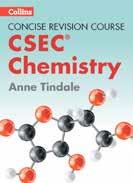

Microbe cells
Microbes or micro-organisms are extremely small organisms that include all members of the Prokaryotae kingdom, e.g. bacteria, many members of the Protoctista kingdom, e.g. amoeba, and some members of the Fungi kingdom, e.g. yeast.
The cells of prokaryotes lack a true nucleus and other membrane-bound organelles. Their DNA exists in a region called the nucleoid, which lacks a nuclear membrane, and also in smaller regions called plasmids

Figure 5.3 A generalised bacterial cell
The cells of protoctists and fungi all have true nuclei surrounded by nuclear membranes, and other membrane-bound organelles.

Figure 5.4 An amoeba Cell specialisation
The body of a unicellular organism consists of one unspecialised cell This cell can carry out all essential life processes. The body of a multicellular organism is composed of many cells. To enable
Collins Concise Revision Course for CSEC® Integrated Science
Authors: Anne Tindale and Peter DeFreitas
This book provides full coverage of the CSEC® Integrated Science syllabus and offers comprehensive and authoritative guidance for the course. It adopts a practical, supportive approach to help students with their learning. The course provides revision exam and assessment questions, as well as the facts required, in a way that makes them easy for students to learn, with annotated diagrams, tables and bulleted lists throughout.

Collins Concise Revision Course for CSEC® Human and Social Biology
Authors: Anne Tindale and Shaun deSouza
This book provides comprehensive and authoritative guidance for the course. It adopts a practical, supportive approach to help students with their learning, while revision, exam and assessment guidance questions consolidate this learning.
• Full coverage of the CSEC® HSB syllabus
• Advice on organising your revision – tips on exam technique, explanations of exam command words, and guidance on drawing graphs, tables and diagrams
• Revision questions at the end of each topic help to secure knowledge and understanding
• Exam-style questions at the end of each section provide effective practice for the actual exam

Collins Multiple Choice Questions Practice Books for CSEC®
Authors: Biology: Anne Tindale
Chemistry: Anne Tindale
Physics: Peter DeFreitas
Maths: Terry David
Human and Social Biology: Shaun deSouza
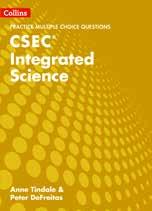

Principles of Business: Sheree Bandoo, Carl Herrera, Tevon La Rose, Sherma Noriega
Principles of Accounts: Dyann Barras, Carl Herrera, Kirk Philip, Lystra Stephens-James
Integrated Science: Anne Tindale, Peter DeFreitas
Collins Multiple Choice Questions Practice books are a valuable exam preparation aid for students preparing for CSEC® examinations.
Providing excellent practice for the multiple choice questions from Paper 1 of the CSEC® examinations, they have been specially written to help CSEC® students improve their Paper 1 exam score.
• Authentic CSEC®-style multiple choice questions
• Questions organised by topics according to the syllabus, providing comprehensive practice of all topics
• Introduction with strategies for answering multiple choice questions effectively
Collins CSEC© Biology MCQ Practice
Collins CSEC© Chemistry MCQ Practice
Collins CSEC© Physics MCQ Practice
Collins CSEC© Human and Social Biology MCQ Practice
Collins CSEC® Maths MCQ Practice
CSEC® Principles of Business MCQ Practice
CSEC® Principles of Accounts MCQ Practice
Collins CSEC® Integrated Science MCQ Practice
978-0-00-819471-0 £8.50
978-0-00-819472-7 £8.50
978-0-00-820087-9 £8.50
978-0-00-827115-2 £8.50
978-0-00-819473-4 £8.50
978-0-00-826895-4 £8.50
978-0-00-826040-8 £8.50
978-0-00-835977-5 £8.50




Answers available for free at collins.co.uk/Caribbean, including worked explanations for the more challenging questions


Collins CSEC® Science Workbooks
Authors: Biology: Anne Tindale Chemistry: Anne Tindale Physics: Terry David
These workbooks provide excellent practice for the structured questions from Paper 2 of the CSEC® examinations. They have been specially written to help students maximise their exam scores.
• Questions and activities on all aspects of the Biology, Chemistry and Physics syllabuses
• Easy-to-use diagrams, charts and graphs for data analysis activities
• Clear mark allocations to indicate the value of each question part
Collins
Collins
Collins

CSEC® Maths Workbook
Author: Terry David


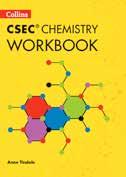
Collins CSEC® Maths Workbook covers all aspects of the CSEC® Mathematics syllabus and provides valuable practice for students to maximise their exam scores.
Collins Science Skills Builder
Start to build the skills needed to succeed in science.
Give students a head start in science with engaging practice activities, clear examples of key science skills, as well as clear explanation of answers and how to improve.
Technical Drawing
Step-by-step practical guide to the basics of technical drawing.
This resource covers all of the basic drawing techniques, rules and styles, and builds up the level of difficulty gradually through simple practice drawings. The skills introduce students to the majority of technical drawing areas for engineering, construction, architectural and other design fields. Technical Drawing 978-0-00-322298-2


Collins Economics for CAPE®
A comprehensive text for students studying for the Caribbean Examination Council’s Advanced Proficiency Examination in Economics.
Author: Dave Ramsingh
Economics for CAPE® covers all aspects of the current syllabus in economics and features examples and contexts with specific relevance to the Caribbean.
This book has been carefully written with an easy and accessible style, to make difficult economics concepts accessible to all students, based on the author’s awareness – from extensive teaching experience – of where students struggle and how to help them.
Clear, concise text describing key economic concepts
• Diagrams, bulleted lists and tables to summarise information
• Examples of common student errors and misconceptions
• Section summaries and end-of-unit summaries to aid revision
• Practice questions at the end of each unit, to enable students to assess their progress
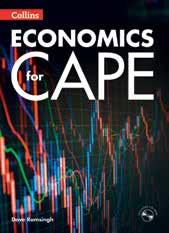
Sociology Themes and Perspectives
Eighth edition of the bestselling sociology textbook.
Authors: Michael Haralambos and Martin Holborn
Sociology Themes and Perspectives is the essential A Level and Undergraduate Sociology guide. It’s fully updated to match the latest sociology teaching, research and developments to support learning. The 8th edition features up-to-date sociological teaching, research, empirical studies and theoretical developments, as well as an all-new section on development and globalisation.
• A comprehensive introduction to sociology suitable for an international audience
• Market-leading text with a recognised heritage, written by an established and trusted team of subject experts
• Clear and comprehensive explanation with contextualised examples and research integrated throughout
• Up-to-date research, empirical studies and theories
• Now in full-colour and in a smaller, more portable format

Collins CAPE® Revision Guides
Available for the following CAPE® syllabuses: Economics, Accounting, Management of Business, Caribbean Studies, Communication Studies.
Authors: Caribbean Studies: Marjorie Downer, Andrea St John and Kevin Thompson
Communication Studies: Brenda Lee Browne and Natalee Cole
Economics: Dave Ramsingh
Accounting: Lystra James and Carl Herrera
Management of Business: Kathleen Singh
Collins CAPE® Revision Guides provide crucial content and skills students need to master for success in CAPE® examinations.
• Full coverage of the exam syllabus
• Clear, succinct explanations of core concepts
• Practical advice and guidance to help students do well in the exam

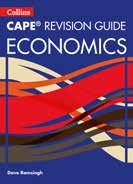




Multiple Choice Questions Practice Books for CAPE®
Authors: Biology: Bernadette Ranglin
Chemistry: Jacquelyn Marshall
Physics: Peter DeFreitas
Accounting: Lystra Stephens-James and Carl Herrera
Economics: Dave Ramsingh
Invaluable exam preparation aids for students preparing for CAPE® examinations in the following subjects: Biology, Chemistry, Physics, Accounting and Economics.
The MCQ Practice Books for CAPE® provide excellent practice for the multiple choice questions from Paper 1 of the CAPE® examination, and have been specially written to help CAPE® students improve their Paper 1 exam score.
• Authentic CAPE®-style multiple choice questions
• Comprehensive practice of all the CAPE® Paper 1 topics
• Introduction with strategies for answering multiple choice questions effectively


3
5



Collins
Collins Cambridge International AS & A Level Mathematics
This five-book series inspires and guides your students to pursue STEM (Science, Technology, Engineering and Mathematics) careers with a Mathematics in Life and Work theme for each chapter, showing how mathematics are used in a range of further study routes. The course covers the syllabus in five books: Pure Mathematics 1, Pure Mathematics 2 & 3, Statistics 1 & 2, and Mechanics, and includes carefully selected Cambridge past paper questions to help students prepare for assessment.

These resources are endorsed for the Cambridge Pathway to support the syllabus (9709) for examination from 2020.




Collins Cambridge International AS & A Level Sciences
Collins Cambridge International AS & A Level Biology, Chemistry and Physics provide in-depth coverage of each respective syllabus. The texts encourage students to develop practical skills in a range of contexts and deepen understanding of key concepts, with regular opportunities to practise and evaluate their learning throughout the course. The Teacher’s Guides are also available to buy as eBooks, which include syllabus mapping, notes on common misconceptions and a wealth of activities.


These resources are endorsed for the Cambridge Pathway to support the syllabuses (9700/9701/9702) for examination from 2022.



Collins Social Studies Atlas for the Caribbean

Age 9+
Collins Social Studies Atlas for the Caribbean is presented in an engaging, full-colour format with clear, easy-to-use maps prepared specifically to support Social Studies and Geography courses at Upper Primary and Lower Secondary levels throughout the Caribbean region.
• Up-to-date reference mapping of individual Caribbean countries
• Supporting facts and statistics allow country-by-country comparisons

Collins Social Studies Atlas for the Caribbean Workbook
Age 9+
This workbook supports the use of the Collins Social Studies Atlas for the Caribbean as a practical tool in the social studies classroom. Includes a wide range of practice activities and worksheets which follow the atlas such as map drawing, group games and research-based projects.

Collins Student Atlas for the Caribbean
The Collins Student Atlas for the Caribbean provides comprehensive coverage of the Caribbean region with accurate mapping of all the Caribbean countries. Perfect for students following the CSEC® Geography syllabus.
• Up-to-date reference and thematic mapping, useful statistics and an extensive index
• Topics include population, climate, economy, industry, trade, tourism, history and the environment
• High-quality satellite imagery, which has been selectively used within the special topic or study areas, supports data on the maps and is used to illustrate key environmental issues
• Relevant data aids students wishing to create their own graphics to support individual projects Collins

Collins Social Studies Atlas for Jamaica
This brightly illustrated atlas is designed to support social studies – including map skills, early geography skills, plus history and heritage topics – at Upper Primary and Lower Secondary in Jamaica.
Content has been developed to support the learning objectives for social studies in the National Standards Curriculum for Grades 4 to 9.
• Up-to-date and easy-to-use mapping and statistics for key Jamaican topics, with content developed in association with the MONA Geoinformatics Institute
• Reference and thematic mapping of the countries within CARICOM as well as the broader Caribbean region, covering key regional topics and challenges
• Maps are fully supported with illustrations, photographs and data Age 9+

Collins Social Studies Atlas for Jamaica Workbook
(for Primary and Secondary)

Age 9+
These workbooks support the use of the Collins Social Studies Atlas for Jamaica. They contain a wide range of activities to help students make the most of the atlas, including critical thinking skills. They are written in line with the National Standards Curriculum to support the learning objectives for Grades 4 to 9 in two workbooks, one for Primary and one for Secondary.



Collins School Atlas for Trinidad and Tobago
This atlas is prepared specifically to support Social Studies, map skills, early geography skills plus history and heritage topics in Trinidad and Tobago. Maps are fully supported with illustrations, photographs and data. World maps cover international issues which have a bearing on Caribbean development.
• Up-to-date and easy-to-use mapping and statistics for key topics in the Trinidad and Tobago Social Studies syllabus for standards 4 and 5, and the Social Sciences syllabus for Forms 1, 2 and 3
• Reference and thematic mapping of the countries within CARICOM as well as the broader Caribbean region
• Thematic maps of the Caribbean region cover key regional topics and challenges
• Maps fully supported with illustrations, photographs and data
Collins School Atlas for Trinidad and Tobago Workbook
The workbook supports the use of the School Atlas for Trinidad and Tobago as a practical tool in the Primary and Secondary Social Studies and Geography classrooms.
• Covers a wide range of social studies and geography topics
• Includes activities and worksheets which follow the atlas
Collins Social Studies Atlas for The Bahamas
Prepared specifically to support Social Studies, including mapping and early geography, plus history and heritage topics of The Bahamas Social Studies curricula for Upper Primary and Lower Secondary, Grades 4 to 9.
• Includes the most up-to-date reference and thematic mapping of the Bahamas and countries within the Caribbean Community and the broader Caribbean region
• Maps are fully supported with illustrations, photographs and data



• World maps cover international issues which have a bearing on Caribbean development

Collins First Atlas
• Collins First Atlas introduces maps with geographical features to help children understand concepts such as shapes and symbols
• Simple, colourful maps with clear labelling gently introduce children to geographical vocabulary
• Pop-ups included on each map in the interactive edition provide additional facts and information
• Teacher notes are included for each map


Collins Primary Atlas
• Provides an engaging introduction to mapping of the UK, Europe and the world
• Develops map-reading skills and builds understanding of the meaning of scale and measuring distances
• Introduces pupils to facts and diagrams about the longest rivers, largest cities, highest mountains and more


Collins School Atlas
Learn with maps.
Journey across the globe with the Collins School Atlas. Fully up-to-date mapping and key statistics designed to support and motivate Lower Secondary students in geographic and mapping skills.
Collins Children’s World Map
Beautifully illustrated wall map for inquisitive kids.
This colourfully illustrated pictorial map takes children on a journey of discovery around the countries of the world.
Stunning illustrations are used to depict themes such as national emblems, customs, food, birds, animals, buildings and sports to help younger readers gain an understanding of the world.


Collins Caribbean School Dictionary
Developed with teachers in the Caribbean to ensure it meets the needs of students following Caribbean syllabuses.
• Up-to-date and with coverage of words from all curriculum subjects
• Social Studies section provides essential information on the world around us, with key facts and maps
• Essential guide to spelling and help with grammar and punctuation
Collins Caribbean Student’s Dictionary
Plus unique survival guide!
• Designed especially for Caribbean students, offering up-to-date coverage of today’s language and ensuring an accurate reflection of English as it is used in a way that is most helpful to the user
• Features a full-length unique survival guide paying particular attention to the CXC syllabus, helping students write clearly and effectively
• Helpful advice on English grammar and usage, writing and presenting your work, CVs, letter-writing and more

Giving a presentation
As with writing, one of the keys to giving a good presentation is organizing your material. Your topic should be clearly stated, logically thought through and explained interestingly enough to hold the interest of your audience.
Notes
• Don’t learn your presentation by heart or write it down word for word. Such strategies make for very boring presentations.
• Make notes to refer to during the presentation in case you dry up. If you write these on index cards, you will be able to put each card to the back of the pile once you have used it and will therefore not lose your place.
• Try practising your presentation in front of a supportive friend or family member. Ask him or her to point out any distracting habits you may have and which you should avoid; for example, fiddling with your hair or saying “you know” too often can be very off-putting to your audience.
Content
• Try to start with something exciting but relevant to make your audience sit up and listen.
• Give an introductory outline of your talk and make sure you stick to it in what follows.
• Avoid introducing a completely new subject later or changing the tone of your presentation halfway through.
• Use linking sentences to lead from one point to the next.
• Give specific examples – this gives the audience something to discuss in a question-and-answer session.
• If you are presenting an argument, build from the weakest to the strongest point.
• Include a few light jokes or puns to entertain your audience, but remember that they should be appropriate to the overall tone.
• Try to bring your own perspective to the presentation material – there may be facts that are known to people in your audience but anything extra you can add will be of interest.
• Don’t be afraid to express your opinions.
• Consider including some aspect of audience participation, provided it is not intimidating and provided you are not dependent on getting a reaction – audiences do not always cooperate. In general, some degree of interaction makes a presentation more interesting.
16 Giving a presentation


• Your presentation should end with a quick recap of the main points and a strong, and preferably exciting, conclusion.
Visual aids
• Use visual aids to illustrate your presentation, provided they are simple, useful and clearly visible from the back of the room.
• Do not overdo the number of visual aids; the last thing you want is to overwhelm your audience with too much visual information and to distract them from your talk.
• If you have access to a computer, you might like to use a presentation program such as PowerPoint®. Keep the number of slides to a minimum and have a maximum of four bullet points per slide. Keep each one short and to the point.
• If giving your audience hand-outs, make sure you have enough for everyone. Do not rely on being able to do photocopies at the last minute.
Timing
• Practise giving your presentation in advance, making sure that you tailor it to fit the time you have been given. Failing to complete your talk by the time the next speaker is due to come on can be a disaster. Similarly, finding that there is too much time to fill can be very stressful and look unprofessional.
• When you practise your presentation and when you give it, make sure you do not talk too quickly. Take your time. Don’t speak at the same rate as you would when chatting to a friend. Slow down and pause for breath between points. This also helps the audience know when you are moving on to a different subject.
Venue
• If you are going to use a computer or interactive whiteboard in your presentation, make sure you are familiar with how it works beforehand. Fumbling for an on-switch in front of your audience will not increase your confidence.
• Make sure there are enough seats to accommodate your audience.
• Familiarize yourself with the venue and its acoustics to ensure that you feel comfortable speaking and know how to project your voice into all corners of the room.
Collins Jamaican School Dictionary
Specially developed in association with teachers in Jamaica to ensure it meets the needs of students in Jamaican schools.
This fully up-to-date dictionary provides coverage of vocabulary from all curriculum subjects to ensure students have the language they need at their fingertips.
The Jamaican School Dictionary provides guidance on grammar and punctuation, and covers key spelling rules, including help with commonly confused and misspelled words as well as support for learning how to spell.
• Coverage of essential words for Upper Primary exams
• Writing skills supplement advises on planning and writing essays and creative writing
• Full-colour social studies supplement provides maps and essential facts for exams
• Easy to use, with colour headwords, clear definitions, an alphabetical tab on each page, and guidance on looking words up

Age 9–14

Collins Jamaican Student’s Dictionary
Specially developed for students in Jamaica.
The Collins Jamaican Student’s Dictionary includes a unique survival guide, providing essential guidance on key aspects on the CXC syllabus, including errors commonly made in exams. It features tips on essay-writing, exams, grammar, letter and CV-writing, and guidance on punctuation and common spelling mistakes, helping students write effectively with confidence. Additional features include entry words in colour for ease of use, detailed word histories and Word Tip usage notes. The SocialStudiessection provides essential information on the Caribbean and Jamaica with key facts and maps.


Collins English Dictionary
• Specially tailored to meet the needs of students at home and in school with comprehensive definitions and word tips to help improve English usage
• Language notes help students to choose the right word
• Provides core vocabulary for key curriculum exam subjects, plus thousands of examples of words in use

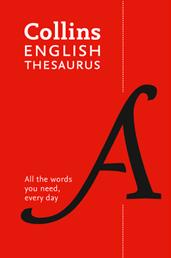
Collins English
Thesaurus
• Up-to-date and comprehensive coverage of today’s language with multiple synonyms per entry and antonyms also included
• Clear, accessible layout makes the thesaurus easy to use and ensures students can find the language they need

Collins School Dictionary and Thesaurus
• Developed in association with teachers to ensure that students have all the vocabulary they need
• Flexible, accessible and durable, this is the ideal resource for children starting Secondary school
• A spelling supplement outlines key spelling rules and lists commonly confused and misspelled words


Collins First School Dictionary
An ideal introduction to the world of words.
The careful choice of vocabulary, clear definitions and simple examples, together with the beautifully designed illustrations help make learning easy, memorable and fun.
The illustrations engage children and help them to understand what words mean, while example sentences show how the words can be used.
• The perfect dictionary for starting school
• Examples and illustrations given to clarify meaning
• Alphabet shown on every page
• Support for spelling, grammar and punctuation



Collins Primary Dictionary
Up-to-date coverage of a wide range of everyday Primary-level vocabulary.
Offers additional language tips and carefully selected and annotated illustrations to help pupils with more complex language.
Includes the latest vocabulary from a range of curricular areas with example sentences and tips on grammar and spelling to help children understand the meaning of words and use them confidently. Synonyms and antonyms are given to build vocabulary.
• Beautiful colour illustrations and photographs
• Full sentence definitions and child-friendly examples
• Word Wizard supplement offers in-depth support with grammar, punctuation and spelling
• Earth and Space supplement offering information on the Solar System, the Earth, the Moon, and the world’s continents, mountains, rivers, oceans and flags



Collins Primary Thesaurus
Clear and accessible, this is an indispensable tool for young creative writers!
This thesaurus helps to build vocabulary with full definitions for every synonym and sample sentences for each word. A simple, step-by-step introduction shows children how to get the best out of their thesaurus, while the colour headwords and A–Z bar on every page make it easy to find the right word. Additional Word Power features on frequently used words encourage children to be more creative in their word choice.
• Full definitions for every entry and sample sentences for each synonym to help improve vocabulary
• Words to use in all types of writing, from fiction to non-fiction, plus advice on particular writing styles
Collins Primary Thesaurus (Paperback) 978-0-00-822205-5 £10.99 Collins Children’s Thesaurus (Hardback) 978-0-00-827118-3 £12.99



Collins Maths Dictionary
Provides simple definitions of key maths terms and concepts in an attractive layout.
• Gives clear explanations of the key maths terms that pupils need
• Makes clear links to show how maths is used in real-life contexts
• Incorporates appealing illustrations and colourful diagrams to help with understanding
• Uses alphabetical presentation for easy access
• Includes extensive supplements which illustrate related mathematical concepts and vocabulary


Reference Dictionaries and Thesauruses

Collins French Dictionaries
Collins is the bestselling bilingual dictionary publisher and is recognised as the trusted dictionary when learning a language. Our range of Collins French dictionaries is the perfect way to learn a new language and refresh old skills.




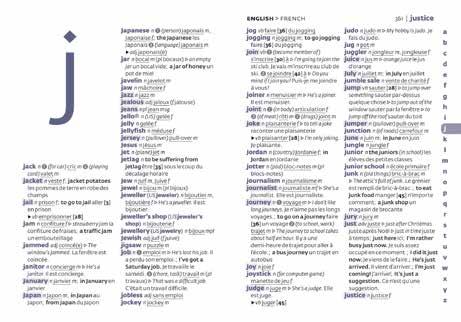




Collins French School Dictionary
Collins Gem French School Dictionary
978-0-00-825796-5
978-0-00-756931-1
Collins Easy Learning French Dictionary 978-0-00-830025-8
Collins Easy Learning French Conversation 978-0-00-811198-4
Collins Easy Learning French Grammar
Collins Easy Learning French Grammar and Practice
978-0-00-814199-8
978-0-00-814163-9
978-0-00-814172-1
Collins French Dictionary and Grammar
Collins Complete and Unabridged Robert French Dictionary 978-0-00-868800-4
Collins Primary French Dictionary 978-0-00-831270-1
Collins First French Dictionary

Collins Spanish Dictionaries
Collins Spanish dictionaries are the perfect way to learn a new language and refresh skills. The Easy Learning series offers easily accessible information in a clear and practical layout along with hundreds of examples to show how Spanish is used. The school dictionaries build students’ confidence to help them progress quickly in their study of Spanish.



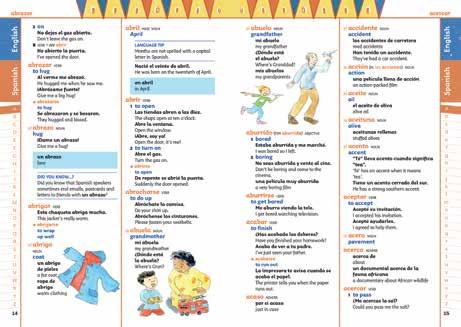



Collins Spanish School Dictionary
Collins Gem Spanish School Dictionary
Collins Easy Learning Spanish Dictionary
Collins Easy Learning Spanish Conversation
Collins Easy Learning Spanish Grammar
Collins Easy Learning Spanish Grammar and Practice
Collins Easy Learning Complete Spanish Grammar, Verbs and Vocabulary

978-0-00-825797-2 £6.99
978-0-00-756930-4 £4.99
978-0-00-830029-6 £10.99
978-0-00-811197-7 £8.99
978-0-00-814201-8 £8.99
978-0-00-814164-6 £12.99
978-0-00-814173-8 £14.99
Pocket Spanish Dictionary
Collins Gem Spanish Dictionary
Collins Spanish Dictionary and Grammar
Collins Complete and Unabridged Spanish Dictionary
Collins Primary Spanish Dictionary
Collins First Spanish Dictionary
collins.co.uk/dictionaries for more information on all our dictionaries

978-0-00-818365-3 £9.99
978-0-00-814184-4 £5.99
978-0-00-824139-1 £14.99
978-0-00-815838-5 £40.00
978-0-00-831269-5 £9.99
978-0-00-831272-5 £6.99
Reference Dictionaries and Thesauruses

Collins Mandarin Dictionaries
The most up-to-date and comprehensive Mandarin Chinese dictionaries and language learning books on the market. The range includes radical index, Pinyin transcriptions, traditional character variants as well as practical tips and cultural insights.
• Traditional character variants provided throughout
• Full Pinyin for all Chinese headwords, head characters, phrases, examples and translations
• Detailed language and cultural notes throughout
• Practical Language in Action supplement giving help with everyday language
Collins Mandarin Chinese Dictionary
Collins Easy Learning Mandarin Chinese Dictionary
Collins Easy Learning Mandarin Chinese Characters
Collins Mandarin Chinese Essential Dictionary
978-0-00-812048-1 £14.99
978-0-00-830028-9 £10.99
978-0-00-819604-2 £10.99
978-0-00-835985-0 £7.99




Collins Visual Dictionaries
A photographic guide to thousands of key words and phrases in a new language. These attractive, pocket-sized book are perfect travel companions and practical guides.
• Everyday words are arranged in themes with carefully selected, up-to-date colour images to illustrate key words and phrases
• Topics covering food and drink, home life, work and school, shopping, sport and leisure, transport, technology and the environment
• Audio allows you to hear native speakers pronounce the word for each image and get your pronunciation pitch perfect
Collins English Visual Dictionary
Collins French Visual Dictionary
Collins Spanish Visual Dictionary
Collins German Visual Dictionary
Collins Italian Visual Dictionary
Collins Mandarin Chinese Visual Dictionary
Collins Arabic Visual Dictionary
Collins Japanese Visual Dictionary
978-0-00-837227-9 £7.99
978-0-00-829031-3 £7.99
978-0-00-829032-0 £7.99
978-0-00-829033-7 £7.99
978-0-00-829034-4 £7.99
978-0-00-829036-8 £7.99
978-0-00-829035-1 £7.99
978-0-00-829037-5 £7.99









Collins and Bookfusion together provide a seamless and secure digital solution for Caribbean schools to access Collins eBook resources.
Students and teachers can:
• Read eBooks both online and offline (no internet connection necessary)
• Use on any device: iOS, Android or desktop (Web)
• Make bookmarks, notes and comments
• Synchronise reading progress and notes across all devices
For more information on which titles are available and to request a free, no-obligation trial, please contact your local representative or email tom.cane@harpercollins.co.uk


Some eBooks are also available on other platforms, contact us for more information.


International Collins_Int

Sign up for emails to receive resources, news and offers at collins.co.uk/intemail
collins.co.uk/Caribbean
To place an order or for any queries, contact:
Collins Caribbean Sales Manager: Tom Cane
Tel: +44 (0)7557 188 350 tom.cane@harpercollins.co.uk
ANGUILLA & ST. MAARTEN
Coral Reef Bookstore
Dawn Reid
Tel: +1 (264) 772-6657
Tel 2: +1 (264) 235-8084 CoralReefBooks@anguillanet.com
ANTIGUA & MONTSERRAT
Best of Books
Barbara Arrindell
Tel: +1 (268) 562 3198 barbaraarrindell@yahoo.com
BARBADOS
Cidgred Cummings
Tel: +1 (246) 829-7166 cidgred@gmail.com
BELIZE
The Book Center
Mickey Craig
Tel: +501 227 7592 books@btl.net
BRITISH VIRGIN ISLANDS
DOMINICA
Jays Ltd
John Lewis
Tel: +1 (767) 448 4024 jays@cwdom.dm
GRENADA
Michael Philbert
Tel: +1 (473) 449 6876 mahp78@gmail.com
GUYANA
Austin’s Book Services
Lloyd Austin
Tel: +1 (592) 227 7395
Tel 2: +1 (592) 226 7350 lloydaustingy@gmail.com
JAMAICA
Full Service Consultants
Kevin Fullerton
Tel: +1 (876) 823 6034
Tel 2: +1 (876) 627 5168 kevinfullerton.collins@gmail.com
ST. LUCIA
Nathaniel’s Books Ltd
Petal Nathaniel-Delice
Tel: +1 (758) 459 0248 petflav@hotmail.com bookstore@candw.lc
ST. VINCENT
Gaymes Book Centre
Dennis Gaymes
Tel: +1 (784) 458 7777
Tel 2: +1 (784) 455 9900 gaymesbookcentre@gmail.com
TRINIDAD & TOBAGO
Keith Khan’s Books Etc. Keith and Khalied Khan
Tel: +1 (868) 653 2665 kkhan@booksetc.net
TURKS & CAICOS ISLANDS
New Age Book Centre
Claudette Clare
Tel: +1 (649) 245 6827
Tel 2: +1 (649) 941 4665 newage174@yahoo.com Keep in
Island Services
Nelda Farrington
Tel: +1 (284) 494-2555 nelda.farrington@islandservicesbvi.com
ST. KITTS & NEVIS
St. Kitts’ School Apex Cooperative Society Ltd.
Tel: +1 (869) 465 5125 schoolsapex@gmail.com
